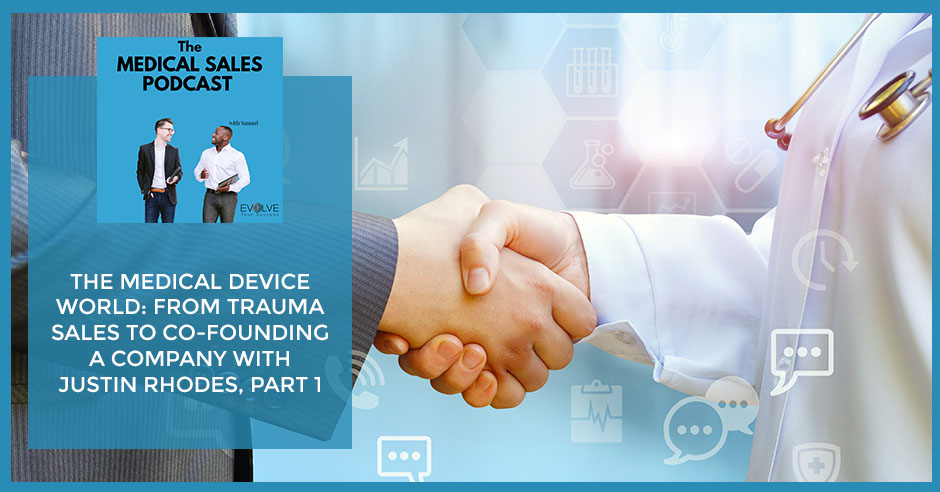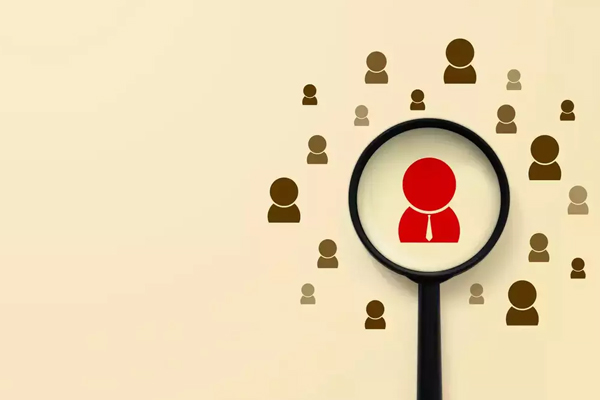
Going into the medical device world is challenging, especially if you want to go to trauma. You will need to change your lifestyle because of the challenges that will come with it. Discover the story of Justin Rhodes and how he got introduced into the medical device world. Learn about his journey into being a trauma medical sales rep to later co-founding Ptch App, which was an easy to use software platform that helped companies & recruiters to save time in the hiring process while empowering ALL candidates the opportunity to be Seen, Heard, & Hired!. Join your host Samuel Gbadebo and his guest Justin Rhodes on his new business and what it takes to be a medical sales rep.
—
Watch the episode here
Listen to the podcast here
The Medical Device World: From Trauma Sales To Co-Founding A Company With Justin Rhodes, Part 1
We have Justin Rhodes. Justin originated in a company called Cintas and then went into the medical sales space. He then went on to found a company with some others called Ptch. They have software that is revolutionizing the way companies interact with candidates and candidates interact with companies. I am not going to spoil it here. I’m going to let you read it and save all the for the interview. As always, thank you for reading the show with Justin Rhodes. We hope you enjoy this interview.
—
Justin, how are we doing?
Samuel, how’s it going? Thanks for having me.
It’s good. I’m glad you’re here. It’s just another day, making it happen. Why don’t you go ahead and introduce yourself and tell everybody who you are?
First of all, thank you for having me. I love your platform for all your success and I love what you’re doing with that. Thank you for the opportunity to talk with you. My name is Justin Rhodes. I’m the Cofounder of Ptch. We help companies value people over paper, help candidates stand out amongst the stack of resumés out there in the world and competing for positions like medical device sales and things like that.
Let’s get into that just a little bit so people understand exactly what you guys do. Is this something for the candidate to use to get a position or is it something that companies use to get candidates into the roles they want to fill?
To give you a little quick little background on our company. I come from the medical device world. I came from the startup world and we were interviewing people and doing phone screens and things like that. We met in person and we would see that we spend all this time and hopefully this person worked out.” They were a good fit but if they weren’t, we spent all this time and we had to start all over again. Conversely, we thought about, “How many people out there are we just casting aside based on the resumé alone and we’re not giving them a chance to be seen and heard?”
We thought about, “This is a good opportunity to help give everybody a voice, listen to everybody’s story and maybe uncover some unconventional talent and unconventional people that maybe have different backgrounds or come from a different industry.” We saw it as two different kinds of scenarios. It helps the company save time in the hiring process, uncover unconventional talent, as well as helping candidates that may not have an opportunity otherwise, based on the resumé alone, stand out amongst the stack of other people that they’re competing with.
How long has this technology been out that you guys have?
[bctt tweet=”To uncover unconventional talent, give everybody a voice and listen to their story.” username=””]
We commercialized in May of 2021. We started it right before COVID. We did market research, feasibility study, built a beta, did a lot of testing, did the MVP and all that stuff. We tweaked it, fine-tuned it. We already have a number of large customers in the medical device recruiting world. We’re still doing our best to help people every day.
What do clients normally say when they experience your services? What’s their feedback typically?
It’s been good. One of the greatest things that I love hearing is that every single customer that has used us said that they’ve hired someone that never would have gotten a chance based on their resumé alone but Ptch got their foot in the door. That’s been the biggest feedback. We have a lot of the time-savings that we hear, 15 to 20 minutes on each candidate, phones screens, scheduling and things like that. It shows that the candidate has intent so they’re not just out there submitting resumés to see what sticks. They actually have to go in and take the extra step to record a pitch. That’s been some good feedback that we’ve gotten and we’re really proud of that.
You hear about these companies that have these self-recorded interviews. That company that has something like that, you guys would be what they’re using as their self-recorded interview.
We’re not going to be a video interviewing platform. There are 20 to 30 different types of video interviewing type companies. We’re more of a vetting and screening tool. We want to be used in lieu of the resumé, alongside the resumé or right before the resumé. A lot of customers referred to us as a video cover letter or a video resumé so that they could see the person. They can see if they have passion, creativity, enthusiasm and see if they took the time to put on a sports jacket, get fixed up or take the time to prepare or whatever it may be.
That way, they can see if this is somebody I want to talk to and have a phone screen with and whatever else. If you think about it, you’re spending 25 to 30 minutes vetting a lot of people out on a phone screen and you don’t see these people until down the road until it’s a video interview or hopefully soon we’ll start to be able to do in-person interviews as well.
Would you say that can a candidate that wants to take advantage of this use that for an employer that’s not even on that platform or utilizing that platform?
Definitely, we have an opportunity for them to just download. It’s free for candidates to be able just to record a general profile for Ptch whether they’re currently employed with somebody or out in the open for work, looking for opportunities. They can go ahead and download that and send it out to employers along with their resumé. They can include their LinkedIn profile, the resumé attached along with that Ptch. That helps them sit out there. It adds value. You were talking about, “What are you doing to take the extra step? What shows me that you really want this job?” Providing a little feedback on who you are as a person and what your story background is goes a long way.

It makes me think of one thing the feature that LinkedIn introduced, which is the add a cover story to your LinkedIn profile. Talk to us a little bit about what you guys do as an added value in lieu of that opportunity that you can take on LinkedIn.
YouTube has been around for a long time and video capabilities, you can record a video on your phone but this is great because you’re able to rate, organize and store your candidates. We have a really cool feature called the My Bench feature. Essentially, if you have a great two great candidates but only one position to fill, you can save these people onto your bench.
That way, if you have another position that’s opening up in six months, you can go back out and reach out to them as opposed to going through your ATS or going back through your stack of resumés to be able to look at this candidate and say, “I remember Jennifer. I remember Jim. I want to talk to them and they’re on my top of mind.”
Another thing, too, is that’s great for collaborating with your colleagues. Let’s say I’m a sales director in Atlanta and I have a position that I’ve hired for here in Atlanta. I had two great candidates but one person could only get the job. I can send this other candidate and collaborate with my colleague in Pittsburgh, for instance and say, “What do you think about this person? They almost got the position here. They’re willing to relocate. Do you think you would want to give them a shot?” I think that’s good as far as collaboration and the collaboration between the hiring managers and the HR teams is what we’ve really seen a huge increase with using our platform.
You started off by telling us that you started in the medical sales space, which has ultimately brought you to co-found this company. Take us back. In college. Was it, “I always want to be into medical sales,” or were you just introduced through a whole different way?
I went to the University of Georgia. I was an athlete growing up. I played baseball for a couple of years in college, not at Georgia but at another school. Transferred into Georgia, I was a Business major in Economics. I started with an amazing company called Cintas. If you’ve ever known anything about Cintas, you’re thrown into some big scenarios early on in your career. I was a 23-year-old in charge of managing people that have been doing the job for years that are 30s, 40s and 50s.
I was able to learn a lot about solving people’s problems and learn a lot about taking care of people and serving others. I think that was a really good experience. B2B sales and I talk with different CEOs. I’d talk to people that ran big corporations or also from the guy that ran the gas station or whatever. It gave me a chance to talk to a lot of different people. Being able to relate to anybody, no matter their background as to who they are is so important in business that led to the medical device.
Tell us about that. You’re right. A lot of people come from a Cintas-type environment and are able to leverage that into a medical sales position. What introduced you to it? Did you always know that it was there and it’s like, “I’m going to make that move?” What happened?
[bctt tweet=”To be able to relate to anybody, no matter their background, is very important in business.” username=””]
I didn’t even know the medical device world existed. I had a good friend of mine in college roommate that worked for Smith & Nephew down in Florida and he said, “What are you doing?” I was like, “I’m working with Cintas. Things are going great.” He’s like, “Have you ever thought of doing this?” I’m like, “What are you doing? What are you talking about?” He’s like, “I’m in the OR helping surgeons out.” I’m like, “What? You? I went to college with you. I know who you are.”
He’s a very intelligent guy. He said, “There are some positions open with our company here in Atlanta.” That’s where I’m from. I reached out and was politely persistent and got the introduction and stayed on top of them. They didn’t get rid of me and they brought me on board. I joined with trauma with Smith & Nephew and developed some great relationships with people then and I still keep in touch with them to this day.
What I want to understand is you went into trauma. Is it that you knew you wanted to be in trauma? Did somebody said that you should look into trauma? Was there was an open position and you just wanted to fill it?
I heard that trauma is a very challenging position. I heard that it’s a value-added position. It’s not for everybody just because the lifestyle is very hard. I heard and just talking with different people including my friend down in Florida, that it’s a great position to be a part of. It teaches you a lot about time management, taking care of people, sales, problem-solving and things like that. It wasn’t something I knew I always wanted to be in.
I knew that there was an opportunity to break into the medical device after I did my research and talking with them over the course of several months and knew that it was something I wanted to get into. I’m glad I did and took the opportunity. It was a huge opportunity and it’s driven the rest of my career since then.
Some of our readers want to get into the industry. They’re learning. They’re saying, “I know about trauma, I’ve heard about trauma. I want to explore that,” or, “I’ve heard about spine. I want to explore that. I’ve heard about cardio.” Tell us a little about trauma specifically. What does a day in the life of a trauma sales rep look like?
It can be the day or night, depending on how long you’re working. You could wake up at 6:30 AM. You’re going to check the board and look at cases to see what it’s coming for the day. If you’re working in a level one trauma center if you’re working in a community hospital, whatever it may be. I worked in the city of Atlanta so I did have a couple of level one trauma centers.
I would go check the board to see what was going on for the cases that day. I could potentially be there from 6:30 AM to 7:00 PM. I can have a light day and be done by 1:00 PM and then go back to the office or go back home for a little bit of lunch and then get a call, “We have some add-on cases here at 5:00 PM. We’re going to do a hip fracture,” or, “We have a GSW, a Gun Shot Wound. We need to go ahead and do an intramedullary nail with scissors.”

All different things could come up. That’s what’s great about trauma too. It’s unexpected. You don’t know what your day is going to be like. It’s not where you wake up and you’re sitting in the office and and you’re sending out emails or answering phones and things like that. It’s always unexpected. No day is the same. To that point, no fracture in trauma is ever the same. There are always different ways to solve the problem.
There are always different ways to help coach the surgeon in the OR and there are always different ways for everybody to collectively come together and solve a problem, which is I love, coming from baseball and teamwork and things like that. In trauma, your value add. You’re not just somebody in there that’s hanging out, listening to music and talking to the surgeon. You have to be on top of your game and know exactly what the next step is or think 3 or 4 steps ahead to help disrupt tech and the surgeon at the same time.
You were in that space for about five years and you went from associate rep to sales rep and I take it that you performed well in that space. What would you say made you such an effective trauma sales rep?
I think just listening to your peers around you, listening to surgeons around you and listening to them talk about what makes somebody successful whether it be in that position, in sales in general, medical device sales in general. Finding the people that are successful but also not only successful but that people like and people want to be around. You don’t necessarily have to be the life of the party but when you’re not around, you’re somebody that’s talked about in a positive way.
Listening to those people and talking with them is how I became successful and tried to mimic those things. Obviously, I try to be a good person every day but mimicking their habits and traits or what they did is why I feel I became successful. Also, you’ve got to tell other people what you want whether it be your director of sales, your AVP or your colleagues around you, “Do you want to go from an associate rep to running an entire territory?”
I put together a proactive business plan to be able to earn my territory after eight months of being an associate because I saw a need for the business up in an underserved area that wasn’t being taken care of. I said, “Give me an opportunity. I’ll turn it around and make sure things look good.” I was given an opportunity. I’m thankful to my director of sales. I took it over and did well with it.
You were at Smith & Nephew and then you made a transition into what company?
I went to a small, little company for a year, a gastrointestinal company and then I went over to a exciting startup called Rotation Medical. They had this startup company. I was the first dedicated rep in the Southeast. It was this amazing product, paradigm-shifting. There’s nothing like it out there ever. Since then, there have been a lot of people trying to copycat that. It was an amazing product and still an amazing product.
[bctt tweet=”Surround yourself with successful people. Listen to them and find out what makes them successful.” username=””]
What prompted the move from Smith & Nephew to that startup?
My wife works in tech startups and I’ve seen what she did with her different companies and things like that. I wanted to try and see what the small startup world was like. In sales, you’ve got to rely on someone yourself. You got to bet on yourself. It’s somewhat entrepreneurial. You don’t want to be a lone wolf. You want to be able to surround yourself with other good reps and learn what you need to do to get better.
From a startup world, I want to see how you can take something that essentially has never been heard of and grow it to this amazing behemoth. When I took over, I only had one surgeon using our product in about five different states so I was in charge of the Southeast. We grew it from one surgeon to over 150 surgeons within this area using it. One to two cases a month to over 120 to 130 cases a month.
You’re killing at the startup, you have a growing business and you’re making waves. What was the next move after that? What happened?
First of all, we were thought of a snake oil salesman coming in with this new product that nobody had heard of. It was great. Speaking of that too, I’d been in the Smith & Nephew and people trusted me. They knew that I just wasn’t this guy that’s fly-by-night salesperson that was going to come in. I built a reputation. That’s one thing for people trying to break into medical devices. It’s not a short-term play. It’s a long-term play.
You’ve got to think about your reputation and that’s essentially all you have. People trusted me in the fact that I have this product and we had limited studies, little limited clinical evidence but they trusted me and I was able to show them different surgeons, that had used it in different areas of the country that were well-respected. They said, “We’ll give it a shot.” We were able to do that and it went really well. We kept growing and then we were eventually acquired by Smith & Nephew. Luckily, I didn’t burn any bridges.
—
That was Justin Rhodes. It’s pretty amazing what he is a part of and what he’s doing with Ptch. I love hearing it. He’s going to get into even more details for part two. Make sure you come back for part two with Justin Rhodes. You might be reading this. You might be someone that thought about getting into medical sales. You’re thinking, “How do I make this happen? What next step do I need to take?” Maybe you’re someone that works for a company like Cintas and you’re thinking, “I love my position. I love what I’m doing and how I’m doing it but I want to venture into something a little different. I want to be that much closer to serving patients and helping providers make better decisions in health care.”
If this is you then you need to make sure you visit EvolveYourSuccess.com and select Attain A Medical Sales Role. Fill out our application and get in touch with us. Let us show you how we can help you get the role of your dreams and help you get into a healthcare sales career. You can visit us on LinkedIn. You can find me under Samuel Adeyinka. Send us a DM. Write to me and we will get back to you. We will invite you to our process to fill an application, have a conversation with us and get access to our resources that can change your life.
Maybe you’re someone that’s in sales and you want to improve your performance. You’ve been thinking about branding yourself in a different way to access customers or reach a larger base. Maybe you’ve been thinking about having a better understanding of how to sell effectively and get traction in your territory. Visit EvolveYourSuccess.com, select Improve Sales Performance and have a conversation with us and let us help you.
As always, we do our best to bring you guests that are doing things, changing the game, making waves in the medical sales space. Make sure you come back next time to read about Justin Rhodes and his company, more about his experience in the industry and leave some tips for you reading to take from.
Important Links:
About Justin Rhodes
 Sales leader with a passion for developing, nurturing and maintaining relationships resulting in business development and sales. Experienced with start-up development, hyper-growth, sales, and integration. Known for taking quick and decisive action on a multitude of projects and various products/teams. I love to see how the collective efforts of so many can make something grow and prosper.
Sales leader with a passion for developing, nurturing and maintaining relationships resulting in business development and sales. Experienced with start-up development, hyper-growth, sales, and integration. Known for taking quick and decisive action on a multitude of projects and various products/teams. I love to see how the collective efforts of so many can make something grow and prosper.
Key Contributions:
● Increase Sales
● Lead People
● Build & nurture relationships
● Management style that is collaborative, strategic, and innovative
Love the show? Subscribe, rate, review, and share!



















































































